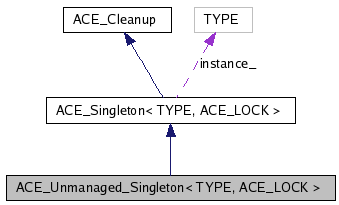ACE_Unmanaged_Singleton< TYPE, ACE_LOCK > Class Template Reference
Same as ACE_Singleton, except does _not_ register with ACE_Object_Manager for destruction. More...
#include <Singleton.h>


Static Public Member Functions | |
| static TYPE * | instance (void) |
| Global access point to the Singleton. | |
| static void | close (void) |
| Explicitly delete the Singleton instance. | |
| static void | dump (void) |
| Dump the state of the object. | |
Protected Member Functions | |
| ACE_Unmanaged_Singleton (void) | |
| Default constructor. | |
Static Protected Member Functions | |
| static ACE_Unmanaged_Singleton < TYPE, ACE_LOCK > *& | instance_i (void) |
| Get pointer to the Singleton instance. | |
Static Protected Attributes | |
| static ACE_Unmanaged_Singleton < TYPE, ACE_LOCK > * | singleton_ = 0 |
| Pointer to the Singleton (ACE_Cleanup) instance. | |
Detailed Description
template<class TYPE, class ACE_LOCK>
class ACE_Unmanaged_Singleton< TYPE, ACE_LOCK >
Same as ACE_Singleton, except does _not_ register with ACE_Object_Manager for destruction.
This version of ACE_Singleton can be used if, for example, its DLL will be unloaded before the ACE_Object_Manager destroys the instance. Unlike with ACE_Singleton, the application is responsible for explicitly destroying the instance after it is no longer needed (if it wants to avoid memory leaks, at least). The close() static member function must be used to explicitly destroy the Singleton. Usage is the same as for ACE_Singleton, but note that if you you declare a friend, the friend class must still be an *ACE_Singleton*<T, [ACE_LOCK]>, not an ACE_Unmanaged_Singleton.
Constructor & Destructor Documentation
| ACE_INLINE ACE_Unmanaged_Singleton< TYPE, ACE_LOCK >::ACE_Unmanaged_Singleton | ( | void | ) | [inline, protected] |
Default constructor.
Member Function Documentation
| TYPE * ACE_Unmanaged_Singleton< TYPE, ACE_LOCK >::instance | ( | void | ) | [inline, static] |
| void ACE_Unmanaged_Singleton< TYPE, ACE_LOCK >::close | ( | void | ) | [inline, static] |
Explicitly delete the Singleton instance.
| void ACE_Unmanaged_Singleton< TYPE, ACE_LOCK >::dump | ( | void | ) | [inline, static] |
| ACE_Unmanaged_Singleton< TYPE, ACE_LOCK > *& ACE_Unmanaged_Singleton< TYPE, ACE_LOCK >::instance_i | ( | void | ) | [inline, static, protected] |
Member Data Documentation
ACE_Unmanaged_Singleton< TYPE, ACE_LOCK > * ACE_Unmanaged_Singleton< TYPE, ACE_LOCK >::singleton_ = 0 [inline, static, protected] |
Pointer to the Singleton (ACE_Cleanup) instance.
Reimplemented from ACE_Singleton< TYPE, ACE_LOCK >.
The documentation for this class was generated from the following files:
 1.5.5
1.5.5